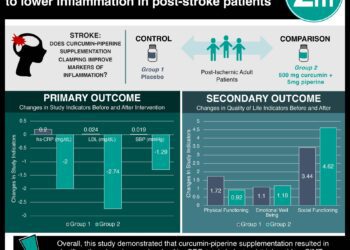Turmeric associated with fewer neural tube defects in mice
1. Mouse embryos cultured in a high glucose environment were less likely to develop neural tube defects when treated with curcumin, a substance from the turmeric plant.
2. Biomarkers for oxidative stress were increased in mouse embryos cultured in a high glucose environment but were reduced when curcumin was administered.
Evidence Rating Level: 2 (Good)
Study Rundown: Diabetes is an increasingly prevalent condition affecting pregnant women. In both cases of pre-existing diabetes and gestational diabetes, diabetes in pregnancy is associated with an increased risk of complications including congenital abnormalities, premature birth, macrosomia, respiratory distress and metabolic disturbances. Among the congenital anomalies associated with diabetes, neural tube defects (NTDs) are one of the most common; women who have diabetes are 20 times more likely to have a child with spina bifida and 13 times more likely to have a child with anencephaly. Current treatment for diabetes in pregnancy focuses on lifestyle modifications and insulin titration, though glycemic control is often sub-optimal due in part to the gestational age-dependent fluctuations in insulin resistance, which peak in the second trimester. Prior work has suggested that oxidative stress, such as increased nitric oxide synthase expression observed in diabetic patients, leads to embryopathies including NTDs. Attempts have been made to identify antioxidant substances that complement traditional methods of glycemic control with limited success. In the present work, authors investigate the impact of curcumin, a substance found in the turmeric plant, on NTDs and markers of oxidative stress in mouse embryos cultured in normal and high glucose environments. They found that embryos cultured in high glucose environments and treated with 20μM curcumin were less likely to experience oxidative stress and develop NTDs.
Strengths of the study included evaluation of both clinical outcomes and possible pathophysiological pathways. While the results are promising, human clinical trials are needed to determine whether the observed results are replicable in human embryos.
Click to read the study in AJOG
Relevant Reading: Oxidative stress and diabetic complications
In-Depth [animal study]: This study evaluated the effect of curcumin, a substance from the turmeric plant, on the development of oxidative stress and neural tube defects in 120 embryonic day 8.5 mouse embryos. Embryos were grown in either 100 or 300 mg/dL glucose environments and treated with 0, 10 or 20μM curcumin. The primary outcome of interest was occurrence of NTDs at 36 hours. Secondary outcomes were markers of oxidative and nitrosative stress (4-HNE, nitrotyrosine-modified protein and LPO) and markers of endoplasmic reticulum stress (p-PERK, p-eIF2a, p-IRE1a, CHOP and BiP) and cleaved caspases 3 and 8, to measure caspase activation at 24 hours.
Mice embryos exposed to high glucose were more likely to develop NTDs, but the incidence significantly decreased with treatment with 20μM curcumin (p<0.05). Oxidative stress biomarkers were increased in the high-glucose group and addition of 20μM curcumin was associated with a decrease in biomarker expression in the high-glucose group (p<0.05).
More from this author: Pregnancy associated with postpartum vascular changes, Similar outcomes after supracervical vs. total hysterectomy, Less wound complications with suture skin closure after C-section, Preeclampsia linked to autism and developmental delay, Misoprostol not linked to peripartum asthma exacerbations
Image: CC/goldentaken/Wikipedia
©2014 2 Minute Medicine, Inc. All rights reserved. No works may be reproduced without expressed written consent from 2 Minute Medicine, Inc. No article should be construed as medical advice and is not intended as such by the authors, editors, staff or by 2 Minute Medicine, Inc.







